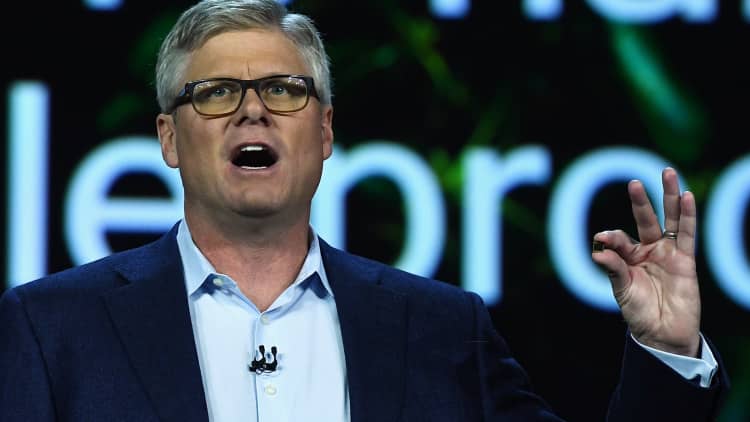
Three years, near-billion dollar settlements in China and South Korea and a slew of litigation with Apple later, Qualcomm CEO Steve Mollenkopf says it's the uniqueness of his business model that has drawn such international scrutiny.
"It's unique so it's easy to attack," Qualcomm CEO Steve Mollenkopf told CNBC's Squawk on the Street Monday. "It just takes a while to go legally and defend yourself. But it's worth doing. It's very valuable to our shareholders."
Qualcomm's business is divided into two main revenue streams: Chips and licensing. The two business, he says, have to stand on their own.
"The licensing business is about licensing the full portfolio of Qualcomm's patents. Some of them involve the chip. Some of them don't involve the chip. In fact the vast majority of them don't involve the chip," said Mollenkopf. "Then on the chip side, we obviously compete in a very, very competitive chip market. And I think when we look at the market — there's no way to conclude that that isn't the most competitive semiconductor industry in the world."

Qualcomm's main chip business grew 5 percent this year, while its patent licensing business fell 42 percent to $1.2 billion, dragged down by missing payments from Apple manufacturers.
At the heart of the allegations between the chipmaker and Apple is the price Apple should pay for Qualcomm's intellectual property.
Mollenkopf believes that the technological advancements made in the iPhone and other devices over the years were made possible by innovations at Qualcomm — which is why royalties that Apple and others pay Qualcomm for their patents are priced at the "end-level". Mollenkopf describes this as a way for Qualcomm to ensure the "certainty" of the device, while Apple argues that Qualcomm is asking for a cut of the end profit that it doesn't deserve.
Without Qualcomm's technology, "you almost can't do anything from getting a GPS location to taking a picture to accessing the OS to doing video and audio encoding," said Mollenkopf. "That's all Qualcomm IP. And so the best way to give certainty to the OEM [Original Equipment Manufacturer] is to license at the portfolio level."
Despite multiple lawsuits and countersuits, not to mention a preliminary injunction filed by Qualcomm in May, Mollenkopf believes that this battle is likely to be settled out of court.
"Typically companies come to agreements out of court. Sometimes on the courtroom steps. Sometimes not on the courtroom steps. And we've had experience over the course of the history — both ways," said Mollenkopf. "It could also be a situation where a solution just appears. You know?"
-- Mollenkopf interview by CNBC's David Faber


